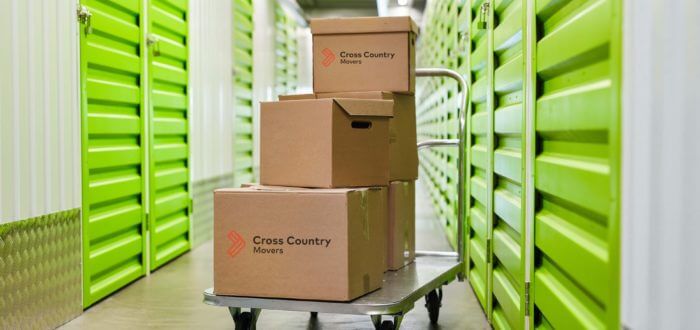

How to Move to a New City – Best Tips and Advice
Posted in How-to,Moving Essentials,Moving Tips & Tricks on June 30, 2021
Long-distance moving isn’t always a fun thing to do. However, people live in the same place for years, and suddenly they realize it’s all a routine. And then, wondering how to move to a new city sets in and isn’t a bad idea at all. Having a fresh start, getting to know people, maybe changing the work – all that can be stressful at first, but after a while, you’ll realize it’s the best thing you could do with your life.
When you considered all the benefits of the move and decided where you will relocate, you should start planning the whole process. Moving cross country will open many questions like “how much money should I save to move to a new city,” and if you have never moved before, it might seem overwhelming. Although it is tagged as one of the most stressful periods of your life, good planning and organization can make it a breeze. That’s why we prepared the best tips and advice that will guide you through the whole process and make it less stressful.
What Is the First Thing to Do When Moving to a New City – Research the Future Neighborhood
If you decided to live on your own and, consequently, relocate to another state alone, or whatever the reasons for the move may be, the first thing to do is get organized. The best way to do it is to create a checklist for all tasks you have to do before and after the relocation. And for even better organization, a relocation binder will be your good friend.
After you have a relocation to-do list that will keep you updated on your next tasks, the next step is to decide where you will live and explore the future neighborhood. Find out as much as you can about your future home.
The best way would be to visit the place in person and see by yourself what you like and dislike about it. However, we all know it can be quite difficult to accomplish that because of all the extra costs and time you have to put in.
But don’t despair – use the power of the internet and find everything about the cost of living, schools, and educational possibilities (if moving cross country with kids,) if there are enough green places if you’re moving across the country with pets, and exploring the business market.

How to Move to a New City – Best Tips for Light Packing and Becoming the Packer of the Year
Packing for most people is the most tedious task in the whole relocation process. If you’re one of them, we have some great tips that will help you pack faster, and it can even become your favorite task.
However, if you can get another pair of hands to help you, do it. Working together with your family and friends is an awesome way to spend some quality moments and check if they know some hacks for packing fragile items and valuable tips on how to pack shoes.
When it comes to putting your items into boxes, the most important thing is to have everything prepared in advance. Be sure you have enough packing supplies. You shouldn’t interrupt everything once you start with this process because you lack bubble wrap. Here are the supplies you should get:
- Boxes,
- Packing paper,
- Bubble wrap,
- Tape,
- Scissors,
- Marker.
After getting familiar with the supplies you’ll need, let’s see what tips you have to use if you opt for light packing.
Start With Decluttering Your Home
Organizing your whole relocation won’t be an easy task to do. However, there are many tricks and hacks you can learn that will help you get through the whole process without stress. One of the most effective methods to make the packing process easier is to declutter your house.
If you moved before, you are familiar with the most common question – what to keep when moving cross country. Decluttering will help you with that because you’ll get rid of all items you don’t need or use anymore.
So, start separating your belongings room by room and create two piles – one to keep and the second not to keep. The second pile you can sell or donate is on the website Goodwill.
Labeling Boxes is One of the Best Ways to Stay Organized
Most of us forget this crucial step – labeling boxes. After you learn some of the most useful packing tips for efficiently wrapping up your clothes and other items, you should remember to label each box.
Write with marker on the box’s sides what is in it – it’s better to pack room by room and write which room is packed in which box. That way, when it comes to unpacking, you won’t lose much time on finding some specific item for the kitchen, for example, because it will be in the “kitchen” box.
Pack Aside an Essential Bag for the Relocation Day
Prepare one bag with the essentials, like some snacks, toilet paper, toys for kids, and pet food. This is a very important thing to do because, when the relocation day comes, you won’t have any free moment to take care of things like this.
Clean Your Old and Future Apartment
Adjusting to your future home can be hard, and you should give yourself some time to get used to life in the unknown surroundings. However, you should do everything you can to make the whole process easier. Imagine what your first impression of the place would be if it is clean and tidy. And now imagine the opposite situation. So, if you’re new at this, learn how to clean the place before you move in and create a comfortable space for yourself.
On the other hand, you shouldn’t leave your old place with all the mess left in the wake of professional cross-country movers loading all the boxes and other items into the truck. So, get your old place cleaned, as well. You can watch the video below with some awesome hacks on how to clean your apartment faster.
Figure Out How Much Money You’ll Need for This Relocation
If wondering how do you move to a new city with no money or job, you better start saving some money right after you decide to move. The reality is you can’t move without any money, even if you choose to DIY. In fact, sometimes it is even more expensive to move on your own because you have to cover all that would otherwise be part of cross-country moving services, from finding a truck to buying or renting storage facilities for your belongings.
So, figuring out how much money you’ll need for the relocation process should be one of the first things to do. Put on paper every little thing essential for the move you can remember, and create a smart relocating budget. From finding out how much professional long-distance movers cost to deciding how to tip the long-distance movers, it can be quite a task to do, but once you have everything planned out, you won’t come to any unexpected expense.
Consider Living With a Roommate If Relocating on a Budget
If some services don’t meet your budget, you’re probably thinking in the line of “how do I move to a new city and save some money.” The answer is to find a roommate and split the costs of rent and utility bills. Maybe it’s not what you planned, but it is a good start if you realize you can’t pay the bills. This is not a bad idea if you’re relocating alone because you can connect with your future roommate and the people she or he knows.

Prepare Yourself for a Productive Interview and Start Looking for a Job
Although relocating without work is possible, it’s better to do some research of the business market before the move. So, if you’re wondering, “how do I get a job in a new city before I move,” we have some great tips you can learn and easily find a job in your future place. The fastest way is to check the most popular occupations in the place you’re relocating to and start applying for the offers you find on Linkedin. However, it might be hard to find the position you’re interested in initially, but don’t get discouraged. You can work some part-time jobs in the first few months, and eventually, the perfect position will come.

Take Care Of the Utilities and Change of Address Before the Relocation Day
Many of us postpone smaller tasks because we think they won’t be much of a problem. But when you don’t get your mail and bills, then the situation becomes troublesome. Tasks like these require just a few minutes of your attention because you can have it done in just one call or two clicks. Contact the utility providers and let them know you’re relocating, and ask them to transfer utilities at least one day before you move in. This task is an important one because you don’t want to enter your future apartment without water, electricity, or heating.
Then you can deal with utilities that can be dealt with online. Let’s see what else you should do before the relocation day:
- Change your address – use the online USPS form and change your address in one minute.
- Update car registration and driver’s license – if you plan on using a car shipping service, you should check if an update of car registration and your driver’s license is needed.
- Update voter registration – a task people often forget when relocating.

Throw a Party and Say Hello to Your Future Neighborhood
Even though it’s going to be a challenging period, you’ll have to upgrade your social life once you move in. You don’t have to start networking right away – use as much time as you want to adjust to the home and whole neighborhood. You’ll start making friends in the future place when you’re ready. When that happens, throw a party and invite your neighbors and coworkers to your place. It’s a great way to meet your future BFF.
Make Connections and Find Groups You’re Interested in
Unknown surroundings can be a problem when you don’t have anyone to talk to. Solve that on your own and join various clubs and groups that interest you. There is at least one sport or book club in every town you can join and meet someone with the same interests.
Don’t Forget to Hear From Your Family and Friends From the Old City
You moved away from your family and the crew you’ve been hanging out with, but that doesn’t mean you can’t stay in touch. Luckily, nowadays, there are many apps with video calls that could be very useful if you’re wondering how to keep in touch with friends after the move. You can set in your calendar a reminder to contact them once a week or whenever you’re free.

How Do I Move to a New City? Contact a Reliable Cross-Country Moving Company to Help You With Your Move
Last but surely not least, contact a trustworthy long-distance moving company like Cross Country Movers to help you with tasks you just can’t deal with.
We can provide a professional packing service with boxes and other supplies included because it can save you a lot of free moments and nerves, as well. We think about our clients’ well-being and state of mind.
Let’s face it – relocation isn’t something you should do on your own. So, hire Cross Country Movers to take care of all the services regarding relocation, leaving the only thing left to relax and think about your future home in a brand-new city.
Frequently Asked Questions About How to Move to a New City
How Do I Research a New City Before Moving?
Some of the things you can do for research are:
- Research the cost of living, including housing, transportation, and utilities,
- Look into the job market and employment opportunities,
- Check out the local climate and weather patterns,
- Investigate the crime rate and overall safety of the area,
- Explore the culture, entertainment options, and local attractions,
- Connect with locals online and in-person to get insider knowledge and recommendations.
What Is the Cost of Living in the New City?
The cost of living in a new city depends on factors such as housing, transportation, utilities, food, and entertainment. Researching these costs before moving can help you budget and plan accordingly.
How Do I Find a Place to Live in the New City?
To find a place to live in a new city, research neighborhoods that fit your budget and lifestyle. Use online rental listings, local real estate agents, and property management companies to search for available apartments or houses. Consider factors like location, commute, amenities, and safety.
What Is the Job Market Like in the New City?
The job market in a new city depends on its economy and industry. Research the local job market by checking job postings, unemployment rates, and the types of companies in the area. Consider networking, attending job fairs, and reaching out to local recruiters or employment agencies to increase your chances of finding employment.
How Do I Prepare for the Climate in the New City?
To prepare for the climate in a new city, research weather patterns and temperatures throughout the year. Pack appropriate clothing and gear for the prevalent season and weather. Plan indoor and outdoor activities that suit the climate, and be aware of any seasonal changes that may affect your daily routine.
How Do I Make Friends and Meet New People in the New City?
Consider joining local clubs or groups that align with your interests, attending events or meetups, volunteering, or taking classes. Utilize social media and online communities to connect with locals and find events or activities. Don’t be afraid to reach out and strike up a conversation with people you meet in everyday situations, such as at a coffee shop or park.
What Should I Do With My Current Belongings Before Moving to the New City?
Before moving to a new city, you should decide what to do with your current belongings. You can donate or sell items you no longer need, pack and bring necessary items, or place them in a storage unit if you plan to return them. Consider the cost and logistics of moving certain items, and prioritize belongings based on their value and necessity.
How Do I Transfer My Utilities and Other Services to My New Home?
To transfer your utilities and other services, contact and inform each service provider of your new address and move-in date. This includes electricity, gas, water, internet, cable, and phone services. Schedule necessary installations or appointments ahead of time, and update your mailing address with relevant companies or organizations.
What Are Some Ways to Save Money When Moving to a New City?
Try packing and moving your belongings yourself instead of hiring movers, selling or donating items you no longer need, and purchasing furniture and household items secondhand.
Plan your move during off-peak times and compare prices for transportation, such as flights or rental cars. Look for free or low-cost activities and events in your new city, and cook at home instead of dining out frequently.
How Do I Budget for My Move to a New City?
Start by creating a list of expenses, including moving costs, travel expenses, and deposits for utilities and rent. Research the cost of living in your new city and adjust your budget accordingly.
Factor in unexpected expenses and create a savings plan if necessary. Look for ways to cut costs, such as packing and moving your belongings yourself, and consider taking advantage of moving-related discounts and promotions.
How Do I Choose the Right Moving Company for My Move to a New City?
You can research and compare companies by reading reviews and checking their credentials, such as licensing and insurance. Request quotes and compare prices and services offered.
Ask for references from previous customers, and consider whether the company has experience with long-distance moves. Finally, ensure that the company provides a clear and detailed contract before hiring them.
What Should I Do With My Vehicle When Moving to a New City?
When moving to a new city, you have several options for your vehicle. You can drive it to your new location, ship it through an auto transport service, or sell it and purchase a new one in your new city. Consider the cost and logistics of each option, as well as the condition and value of your vehicle. Be sure to update your vehicle registration and insurance with your new address as well.
What Are the Best Neighborhoods to Live in the New City?
The best neighborhoods depend on individual preferences and priorities. Research neighborhoods that fit your lifestyle and budget, and consider factors such as safety, access to public transportation, proximity to amenities and attractions, and the local school district if applicable. Look for neighborhood reviews, talk to locals, and visit neighborhoods in person to get a better feel for the area.
How Do I Enroll in New Schools and Find Child Care For My Family When Moving to a New City?
To enroll in new schools and find childcare in a new city, research schools, and daycare providers in your new area, and schedule visits or interviews before making a decision. Also, obtain necessary documentation, such as birth certificates and immunization records.
How Can I Make the Transition to the New City as Smooth and Stress-Free as Possible?
To make the transition to a new city as smooth and stress-free as possible, plan ahead and stay organized. Research your new city and create a budget and timeline for your move. Connect with locals online and in person to get insider knowledge and recommendations. Take breaks and prioritize self-care during the moving process.




